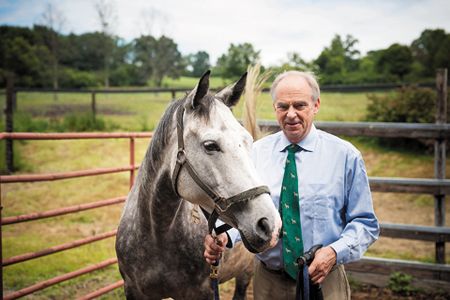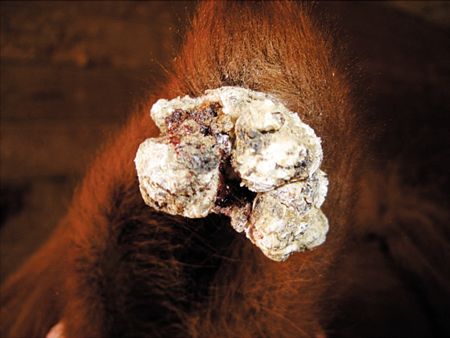Study has implications for treatment of sarcoid tumors in horses and human cancers
Immune system, genetic link may explain why some horses develop tumors and others dontsimilar to human papillomavirus.

Cornell's Doug Antczak, DVM, and his collaborators found that the region of chromosome 20 associated with sarcoid development is within a portion of the genome responsible for immune function. Photos courtesy of Cornell University.Sarcoid skin tumors are the most common form of cancer in horses, but little is known about why the papillomavirus behind them strikes some horses and not others. Now a new study by an international research group led by scientists at the Baker Institute for Animal Health at Cornell's College of Veterinary Medicine shows that genetic differences in immune function between horses partly accounts for these differences. The study, published in the International Journal of Cancer,1 mirrors findings in humans, states a release from Cornell University, as some people have a genetic susceptibility to human papillomavirus, which can cause cervical and other types of cancer.
“Many therapies have been proposed as the ‘best' treatment for sarcoids,” says Cornell's Doug Antczak, VMD, PhD, who led the study, in the release. In some horses, tumors develop as small bumps under the skin or as scaly lesions that can easily be removed by a veterinarian, but in other horses the problem becomes much more serious. Surgery, cryotherapy (freezing the tissue), laser treatment, injecting the tumors with drugs to kill the cells, radiation treatment and immunotherapy have all been shown to cure these recalcitrant tumors, “but some tumors tend to recur no matter what treatment is used, and there is no universal consensus on a uniformly successful therapy,” says Antczak.

A 3 cm sarcoid tumor on a horse's ear. Sarcoids often develop as small bumps under the skin or scaly lesions like the one in the photo. Depending on their location on the horse's body, tumors like these can often be removed by a veterinarian. However, in certain horses sarcoids tend to regrow after surgery, sometimes to much larger tumors that are impossible to cure.
Antczak says it's been thought for years that bovine papillomavirus (BPV) is the most likely culprit behind sarcoid tumors. Recent work from Europe suggests variants of the BPV have become adapted to horses and are probably the cause of most sarcoids, he says.
Antczak and his team applied a genome-wide association study to compare the genetic makeup of horses with and without sarcoid tumors at more than 50,000 sites in the equine genome. They studied 82 sarcoid-bearing horses from the United States and United Kingdom and 272 carefully matched controls that did not have sarcoids. They found regions on chromosomes 20 and 22 that tended to be different in horses diagnosed with sarcoids, evidence that a horse's genes determine, in part, how susceptible it is to sarcoids.
“This is an example of more complicated genetics-multigene susceptibility,” says Antczak. “More than one genetic region is associated with susceptibility to sarcoids, and they don't completely determine whether or not a horse will develop the disease once it's exposed to BPV.”
This genetic link implicates the immune system in sarcoid susceptibility. The region of chromosome 20 associated with sarcoid development is within a portion of the genome responsible for immune function called the major histocompatibility complex (MHC) class II region. The MHC type associated with sarcoid susceptibility is very rare among standardbred horses, a fact that may explain why sarcoid is diagnosed so rarely in this breed.
This complex mix of virus, host genes and tumor development may have relevance to a related human condition. Tumors caused by human papillomaviruses account for more than 5 percent of cancer cases worldwide. In women with cervical cancer, an association with the MHC class II region has also been shown.
“That should make a light bulb go off,” Antczak says. “It suggests there's a common mechanism in both species for susceptibility to tumor progression that may involve subversion of the host immune response. By studying this phenomenon in horses you can learn about human cancer and vice versa.”
Reference
1. Staiger EA, Tseng CT, Miller D, et al. Host genetic influence on papillomavirus-induced tumors in the horse. Int J Cancer 2016;139:784-792.